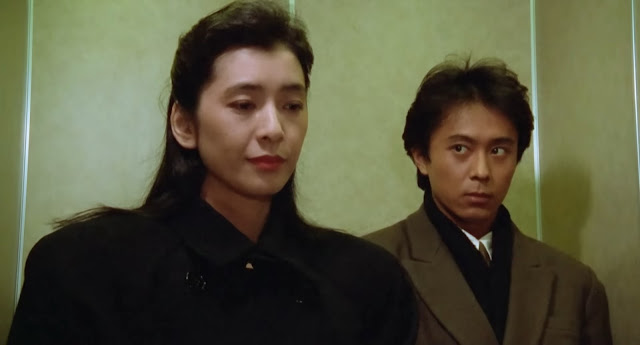Fair to say that 2023 was one of the best years for physical media since the COVID-19 lockdowns. It was also the year which redeemed Criterion, the label of choice for annoying cinephiles. Personally, I've always found its reputation as the curator of the crème de la crème in film pompously pretentious, but its 4K releases of Martin Scorsese's After Hours and Tod Browning's Freaks earned it some positive points from me after its censoring of William Friedkin's The French Connection on its streaming channel.
And so, here are six films (I ended up doing one extra by mistake and spent too long writing it to delete it, but I'll pretend it was intentional) which would further elevate my approval of the "prestigious film label" by simultaneously catering to degenerates such as myself and its horrible fanbase consisting of poncey snobs:
The Sadist (James Landis, 1963)

How is Critierion going to have Terrence Malick's
Badlands (1973) and not include the film which started the trend for murderous psycho couples? James Landis's
The Sadist is a shocking film, laced with levels of nihilistic violence that feels well ahead of its time. If that's not enough, it's blessed with stupendous levels of suspense and tension to satisfy the Hitchcock crowd, too.
The Sadist might fall under the juvenile deliquency umbrella of exploitation cinema, but it definitely deserves to be evaluated as a legitimately finely honed thriller by all the kino heads. One of my favourite
discoveries from last year.

Admittedly, I haven't watched this film since catching it on TV sometime in the mid-eighties, therefore, I really don't know how well it holds up today, but I do remember being intrigued by it. Also, I’m convinced the LL Cool J song serves more as a reference to the film than the actual candy bar of the same name. I do remember the ending being unexpectedly brutal, however. Diane Keaton plays a goody two shoes school teacher by day, who rebels against her strict Catholic upbringing by getting involved with various dodgy blokes in smokey bars at night. Apparently, the film forever changed bar culture by women no longer commonly frequenting watering holes alone It's a shame the film is out of print after casting such a spot light on the perils of hooking-up.

How weird is it that so many words and phrases originating from George Orwell's classic dystopian nightmare have made it into the English lexicon, and yet, you can barely find Michael Radford's adaptation of it anywhere? A real shame, as it's not only amongst the best British films to have come out during the eighties, but it also boasts the last great performance of the legendary Richard Burton along with John Hurt's brilliant portrayal of protagonist Winston Smith. Nineteen Eighty-Four has been released by Criterion in the US, but it's way too expensive to import it over here, sadly.
Man Bites Dog (Rémy Belvaux, Benoît Poelvoorde & André Bonzel, 1992)
%201080p%20-%20YouTube.png)
Unlike the August Underground trilogy, this is how the cinéma vérité style should be when realising serial killer(s) on film. Man Bites Dog accomplishes a remarkable feat by simultaneously having me laughing and being disturbed by it. It's an entertaining mockumentary where a roaming film crew become complicit accomplices with their subject matter, a Beligian serial killer. It's a powerful commentary on film violence and how we're desensitised by it. A criminally forgotten film today which had a lot of contoversy upon its release with the tabloid press screaming for it to be banned.
Fresh (Boaz Yakin, 1994)
%20Official%20Trailer%20-%20Samuel%20L.%20Jackson%20Movie%20HD%20-%20YouTube.png)
Thankful for Criterion having released Deep Cover (1992) as it has aged remarkably well today; working well as both a nineties neo-noir and as part of the collective of rapsploitation films which were common during that era. Boaz Yakin's Fresh is another film worthy of the same treatment, as it also straddles the thin line of typical rapsploitation and NY indie cinema. The film contains an impressive cast, which includes Giancarlo Esposito, Samuel L. Jackson and the best child actor since Fool from The People Under the Stairs (1991). Fresh follows the same plot template as Yojimbo (1961), A Fistful of Dollars (1964) and The Warrior and the Sorceress (1984) as they're all based on Dashiell Hammett's novel, Red Harvest.

Much like that saying about cunninlingus: for everyone who won't, there's someone who will. South Korean cinema has risen in popularity due to American films not being able to or unwilling to make films they were once lauded for. Na Hong-jin's debut is a fantastic film which feels like the missing link between Old Boy (2003) and I Saw the Devil (2010); that already puts it in good company. It's a shame it doesn't get the appreciation it deserves as it one of the shining offerings which really put Korean cinema on the map for me in the noughties.
Couldn't care less which label releases these films on blu-ray; I just care about making these films easier to get hold of, in all honesty. As mentioned earlier, I don't agree with the echochamber of Criterion being the purveyors of great cinema; they're more of a status label more than anything else, but having more films like the ones listed above might have me improving my opinion on the label.















%201080p%20-%20YouTube.png)
%20Official%20Trailer%20-%20Samuel%20L.%20Jackson%20Movie%20HD%20-%20YouTube.png)












